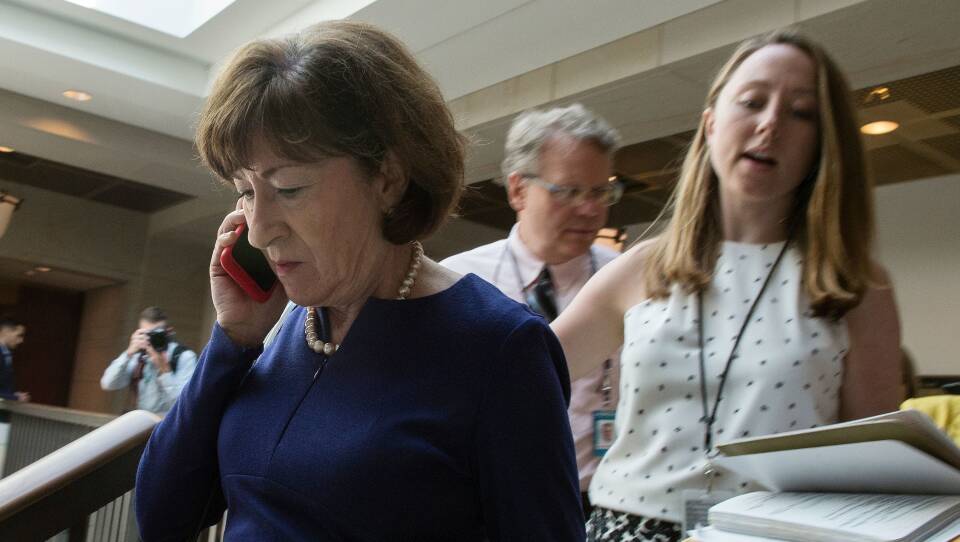The Senate advanced Brett Kavanaugh's nomination to the Supreme Court, 51 to 49, Friday. A final vote could come in the next 24 hours.
So does that make it a done deal? No.
Let's explain.
What was Friday's vote?
First, here's what it wasn't — the final vote on Kavanaugh's confirmation. That's expected Saturday.
Friday's vote was on what's known as cloture. That's whether to end, or close, debate. For this vote, that was to end debate on Kavanaugh's nomination and advance it to a final vote.
Think of it this way: Don't you ever have those moments when someone just won't stop talking, and you want to say, "Enough already"? When they won't stop talking in the Senate, that's called a filibuster. And to cut them off in the Senate, you need 60 votes to do it.
But not for Supreme Court nominations anymore.
Why doesn't the Senate require 60 votes anymore to confirm a Supreme Court nominee?
Democratic Leader Harry Reid, when he was majority leader in 2013 , grew frustrated by Republicans' record use of the filibuster.
Sen. Mitch McConnell, then minority leader, hatched a plan to thwart President Barack Obama from remaking the federal judiciary by aligning Republicans against Obama's nominees in lockstep. That made it impossible to get 60 votes, thereby making it impossible for Obama to get anyone through.
In response, Reid threatened to change the rules and get rid of the 60-vote requirement for lower court nominees. McConnell persisted, and Reid changed the rules. McConnell then warned that he would up the ante and blow up the filibuster for Supreme Court nominees, and when he got in power, he did just that last year during the confirmation process for Neil Gorsuch.
That leaves us where we are now with an acrimonious and pitched political battle, roughly along party lines, to vote through a Supreme Court nominee.
OK, so the vote Friday was 51-49. Who voted and how?
The key quartet everyone has been watching are Republicans Jeff Flake of Arizona, Susan Collins of Maine and Lisa Murkowski of Alaska, and Democrat Joe Manchin of West Virginia.
Three of the four voted for cloture and to advance Kavanaugh — Flake, Collins and, surprisingly to some, Manchin.
That was enough for a majority.
If Manchin had voted no, would that have sunk Kavanaugh?
No, because that would make it a 50-50 tie, and Vice President Pence would be called in to break the tie in his titular role as president of the Senate.
So is this a done deal? Do the senators have to vote the same way on a final vote?
No. There's nothing stopping any of them from changing their vote. It's a completely new vote. It is rare for someone to change a vote from one step to another, but it's not unheard of.
Some senators are fine with advancing a nomination or bill to be voted on, but not OK with the nominee or the substance of legislation.
Why might a senator change his or her vote from one step to another?
Some senators object to the increased use of the filibuster and might want to uphold what they call "regular order." The late Sen. John McCain, for example, voted in favor of advancing the GOP's Affordable Care Act repeal legislation to the Senate floor and then dramatically voted no on final passage.
Some might want to thread a political needle, especially when they're in the majority, but in a state that leans the opposite way from their party.
For example, say you are a Republican, from a left-leaning state like Maine. You might not want to appear to be siding with Democrats in trying to outright block a nominee but want to wait to announce your final vote.
Collins is from Maine. Any indication that she or any of these senators will or might change their votes?
We don't know. Collins is expected to announce her vote at 3 p.m. ET. Friday But here's something fascinating: Last year, Collins voted yes in committee on Trump Education Secretary Betsy DeVos, but then voted against her in the final vote. Her reason: DeVos wasn't strong enough on public education.
A committee vote is not exactly the same as ending cloture, but it's a decent corollary as a two-step process. We have no indication how Collins will vote at this point. McConnell lunched with Collins and said he was optimistic about Saturday's vote.
How might this play out?
It's less likely Murkowski will change her vote. Voting no on cloture for someone nominated by the president of your own party is a bold move. It signals she has real concerns that have not been overcome. It's hard to see how that happens in the next 24 hours when the FBI investigation is already wrapped up.
Flake told reporters after the cloture vote that he expects to be a yes on final confirmation. "I would think so," Flake said. He noted, "Unless something big changes, I don't see what would. But anyway I'm glad we had a better process. We needed a better process."
That leaves two — Collins and Manchin. We will find out shortly Collins' decision. If she changes her vote, that would leave Manchin with a decision to make. Does he want to be the Democrat who confirmed Kavanaugh to the Supreme Court?
Why would Manchin vote yes? Manchin is up for re-election in a very red state, West Virginia. Trump won West Virginia by more than 40 points. Manchin is favored to win re-election, but the Kavanaugh confirmation battle has fired up what was seen as a dormant Republican base.
Manchin is trying to tread carefully and not jeopardize his chances.
Copyright 2018 NPR. To see more, visit http://www.npr.org/.




